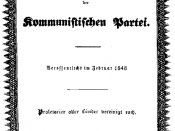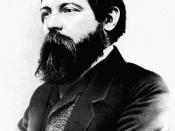Marx's definition of class. It's strengths and weaknesses. -
Although the concept of class has a central importance in Marxist theory, Marx does not
define it in a systematic form. Marx left this problem of producing a definition of the concept of
social class until much later. The manuscript of the third volume of Capital breaks off at the
moment when Marx was about to answer the question: 'What constitutes a class?' Even without
his definition of class, one can reconstruct how the term is to be understood in his writings.
In the Communist Manifesto, Marx presents us with a theory of world history as a
succession of class struggles for economic and political power. The main classes of pre-capitalist
societies are stated as: 'freeman and slave, patrician and plebeian, lord and serf, guild-master and
journeyman'1. But the dominant theme of Western society is the conflict between the exploiting
bourgeoisie and the exploited proletariat.
Thus it is the class structure of early capitalism, and the
class struggles of this form of society, which constituted the main reference point for the Marxist
theory of history. This is asserted by the Communist Manifesto's famous phrase, that 'the history
of all hitherto existing society is the history of all class struggles'2.
The history of 'civilized' society, for Marx, has been the history of different forms of class
exploitation and domination. It is the form of class domination present which determines the
general character of the whole social structure. For example, the growing of wheat using
traditional, non-mechanical techniques is compatible with a wide range of social relations of
production. A Roman citizen often owned slaves who worked his land growing wheat; a feudal
lord would seize the surplus wheat grown by the serf on the lands; the early capitalist farmers...



Citation
Where can I find the citation of this eassay?
1 out of 1 people found this comment useful.